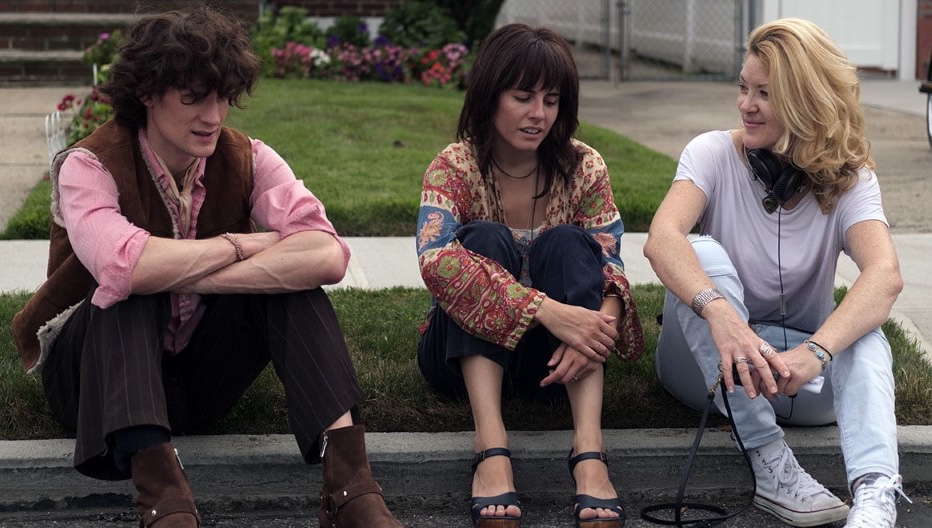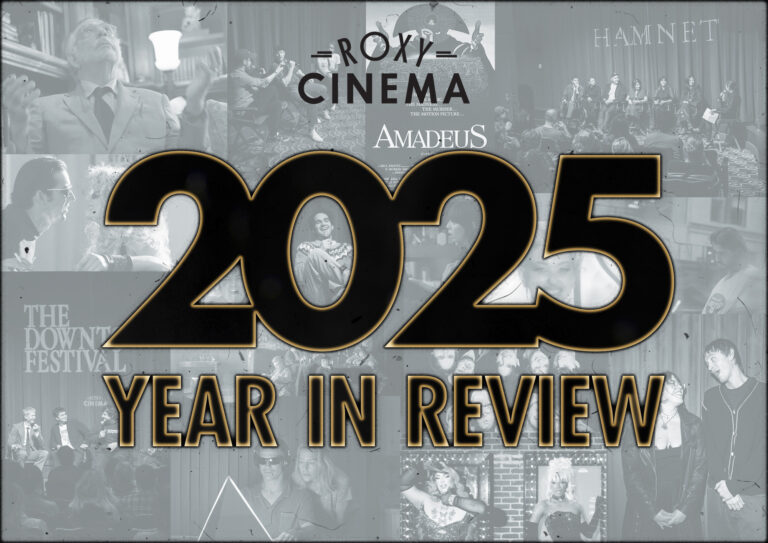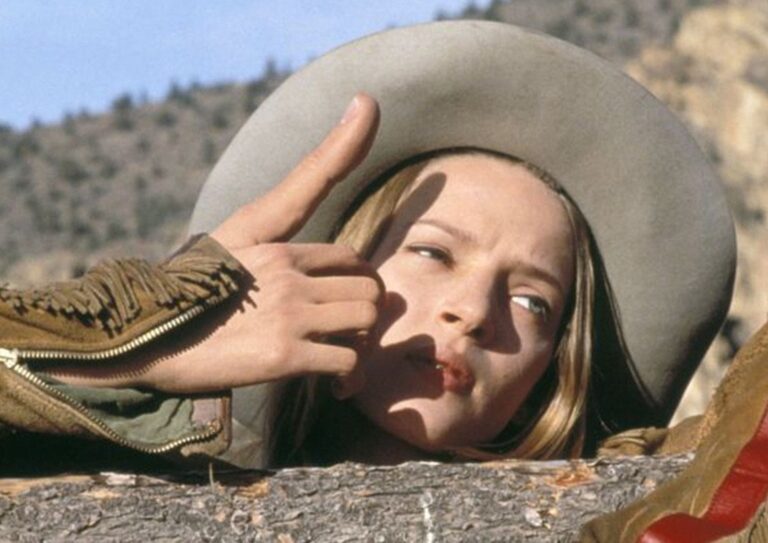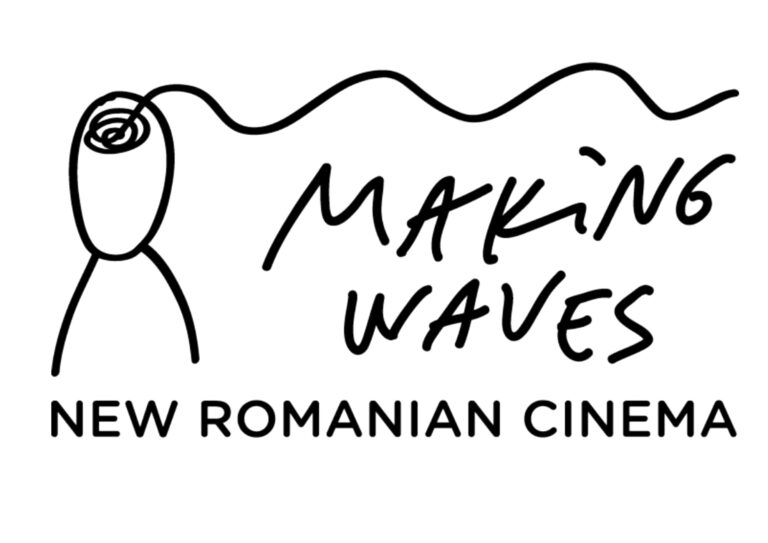A Conversation with Ondi Timoner
Famed documentarian and director Ondi Timoner talks filmmaking, family, and her fave movies to rewatch with Roxy Cinema's Illyse Singer.

Ondi Timoner is an American documentarian and film director who has twice won the Grand Jury Prize at Sundance, for Dig! (2004) and We Live In Public (2009). Roxy Cinema New York will be hosting Timoner’s retrospective to honor the release of her latest film, Last Flight Home, a very poignant, personal documentary of the last days of her father who chose to end his life in assisted suicide. Roxy Cinema will also be screening Dig!, We Live In Public, and Mapplethorpe (Director’s Cut) as a part of the series. Timoner will be present at every screening for a Q&A following each film! Timoner sat down with the Roxy Cinema Director Illyse Singer to discuss her latest work and the series.
Illyse
We’re very excited to host your retrospective at the Roxy. Is there one film that stands out in particular for you?
Ondi
I would say, absolutely “Last Flight Home”. Not only because we’re screening it everywhere right now, and I’ve just been on the road with it for a few months, but because- mostly because it’s really about my father, who was the most exquisite human being I ever knew. And, sharing him in cinematic form brings home the magic and power of cinema, like no experience I’ve ever had in my entire life. It’s just unbelievable. He now lives on in the hearts of so many people who see the film, and then he also helps them and heals them from beyond the grave. As does my family, you know, who are still here, and it’s brought our family together in a way that is really extraordinary as well. So I’d have to say, it’s been the greatest experience of making and releasing a film I’ve ever had…Even on an emotional level…filmmaking was here for me in a way that it never has been in my career. Because I was so scared to lose Dad, you know. And I was able to set up cameras, which allowed me to be more present and to be able to just focus because I knew that I wasn’t going to lose him entirely. Yeah. And he blessed that, you know, he gave me his blessing for that, for sure. He said, “I instinctively know you’re on the right track,” when I asked him permission.
Illyse
That’s so nice. That’s so cool.
Ondi
Yeah, he was always so supportive, you know?
Illyse
It’s so important to have supportive family.
Ondi
Yeah, that’s the thing is, I think the film is a really important strip of potential love that can happen in a family. It’s really a love story more than anything..The healing it’s done for my mom too you know, getting her through her grief. And it, allowing me to grieve with the dimension I think very few people ever really get a chance to experience because there he was, like, suddenly alive after his-after he was physically gone, inside the machine. So I just kept editing because I loved spending time with him, you know? Yeah, learning from him and everything. He was just a fountain of wisdom and grace, you know. But I didn’t ever expect to make a documentary. I had a script about him always. It was just, I panicked and set up cameras. And that’s how the film was born.
Illyse
Really, that kind of leads me to the next question, was it more difficult or more rewarding to make a film about your family? Did it help you that it was so personal has it taught you any lessons that you’ll carry forward with you for creating new work?
Ondi
I feel like it’s easier to. It was easier for me to make this film in certain ways than any other film. And yet, it was also more challenging. Because there’s so many layers when you’re dealing with your family, you know, and in the case of my family, my sister is a very prominent Rabbi and spiritual leader across many faiths and, and also political leader, and there was a lot at stake in sharing her story because helping someone die is a violation of Jewish law… It was a violation of Jewish law. Until this year, they’ve changed their stance. Yeah. So I was putting her on the line. And she was like, not necessarily a fan of cameras to begin with, you know, so.There was that tension. And now she wants for everyone in the world to see it, and tours with the film. So she and I have been making a film about her for a few years, but now making a film about her has gotten a lot easier because she has seen the healing impact that film can have.
Illyse
It’s completely changed her opinion, it sounds like.
Ondi
Yes, she has changed her opinion.But enough about that. Your question about making a film about my family. I’ve been itching to do it for a long time. Like I’ve been wanting to tell my family story since the beginning of my career. So for me, it was scratching a huge itch to make this film but yeah, without even realizing that that’s what I was doing. But, you know, it was such a concentrated period of time. And it was the most transformational experience of my life. And being in that beautiful sacred space, with my family and with dad and everybody sort of improvising and learning together, and Rachel bringing these age-old rituals in and you know, it was just such an incredible experience that was clearly meant to be a film even before I realized it. So it was easy in that way, because it flowed right out of me, like, instinctually. Like, I didn’t even have to make decisions, like, editing-wise. I made 1000 million decisions, of course, but I- as one does when we’re editing- but it flowed out without me questioning anything. I just knew exactly what to do as if my dad was working through me. But then his death was very hard to relive 50, 70, 80 times over in order to cut it. And of course, that’s, you know, very close to the very end of the film. And so every time I come back to do a Q&A is like, I relive the death of my father, again, and again and again. So that’s difficult. But my family is, is like the Happiest Story I could tell. You know, because I’ve been so blessed to be born into this family. And we have such a wonderful time together. In terms of learning, I just think like, I’ve always tried to make films about things that I care about and, and people that inspire me and push the boundaries, you know, and, like, make us think differently about how we live and, and that’s what I tried to do, I don’t make work that, you know, does anything but that. My father was…like, Josh Harris, like Anton Newcomb, like, Russell Brand, like, even beyond Robert Mapplethorpe, you know, an impossible visionary, he was somebody who just took on the impossible. Even if people didn’t understand it, or thought it was crazy, like all of these people that I follow, and have followed my camera, have vision that they can see that they believe in, clearly, that other people have some doubt about or that is, some people say, Oh, can’t be done. Or, you know, or just don’t believe in it, and they have to kind of act impossibly or just be tenacious and be courageous. And they do what they do against all odds, and just by, you know, whatever ridicule or doubt comes their way and that I feel like my father fit right into that, but that’s what the films all have in common, you know, is that there is always- even Amanda Palmer- there’s just people that are trying to push past, push past boundaries to follow what they truly believe in, you know. And my dad, for 40 years, you know, was paralyzed and by an accidental stroke from his neck being cracked in a massage, and he didn’t go and just sit in a corner. No, he rooted all of us on constantly. Never did a plane land that I didn’t turn on my phone and my dad’s voice wasn’t on the other end of having tracked the flight, you know? So he’s a teacher, on how to suffer gracefully, and how to be generous, you know?
Illyse
That’s been your investigative voice through all of your filmmaking, including your narrative films, right? You’re kind of always searching for that answer through these really interesting visionaries. And I guess that’s something that probably your father instilled in you.
Ondi
Yeah, I don’t even know if it’s searching for an answer or as much as pointing to a process. You know, I like to highlight the process of going through life consciously, questioning what we believe in, then pushing to, to realize our dreams. I feel like all of us have those. And I like to picture characters that are determined to do what they’re going to do. And they do it against the odds, you know? And that’s the process of it always.
Illyse
We’re showing your personal print of Dig!
Ondi
The release of “Dig” was the kickoff of my career. Yeah. 19 years ago, and I actually finished it the week I gave birth to my son Juki. Who’s now 19. So I can always tell how old “Dig” is. It was like the beginning of a lot of things for me. And, before that, I was filming it through my 20s It’s by far my most personal film before, before “Last Flight Home.” Because, you know, it was our youth growing up with those bands. I shot this movie from when I was 23 to when I was 30. So it’s very personal. And it’s also very DIY like this. It was how I learned. So my big question was,Can one maintain their integrity as an artist and reach a mass audience? Like, could it be possible for the Brian Jonestown Massacre to succeed, doing it the way that they wanted to do it? I mean, I started with 10 bands. And I ended up with these two, one who had just signed to Capitol Records. And one who was self-destroying. I didn’t know this at the time but he was about to get signed. But then he just kept self-destructing and destroying every business opportunity. But in the name of integrity, artistic integrity. So really, the film is kind of like, I don’t know, I feel like it’s like a real-life “Amadeus” in a way? It’s also a cautionary tale. As many of my films are. It was an incredible time of my life. And I’m really glad that I captured it on camera, and I just didn’t intend to shoot it for seven years. I think that we as filmmakers often don’t know what we’re doing at the time. But what happened was, I was trying to film life as it unfolded. So I could recreate the serendipity for people of what like the magical journey of one thing leading to the next but you don’t know why it happened. So I wanted to make a suspense-driven film out of real footage, and that wasn’t back then something people did. The only closest thing was “Hoop Dreams” before that. It was not since Verite films of the 60s. And in the early 90s, there was no such thing happening. It seemed like they were all retrospectives and history books and stuff. So I wanted to make real life… I thought your life was more interesting than anything I could write. And so I wanted to set out to tell a story that unfolded over time. So I started by filming 10 bands on the verge of getting signed to look at the collision of art and commerce. And I ended up with these two. And, then the reason I ended up with them was because Anton was like, forget about all these other bands. I’m taking over your documentary, and I didn’t believe him. But he did within six months. So yeah. You see the movie, and you understand why? And the fact that it’s on 35MM and thatwe’re flying in the 35MM print makes it that much more special. Because I’ve shot a lot of Super Eight, you know, in the film. And, yeah, my brother, I think was the person who turned me on to Super Eight in the beginning, and it was really the right texture. Film is the right texture for this film. It is like a Verite film from the 60s. You know, it unfolds. What happens is just so crazy that you can’t write it. Actually, if I wrote it, people would be like, “That’s ridiculous”. So film, film is perfect because it has this kind of textured, you know, grainy, nostalgic feeling. And that was the thing about those bands is that they were like, from the 60s but didn’t get the memo. They were out of a time machine in a way. it was such a bummer for them to have to exist in the 90s. You know, because they were actually from the 60s. But as Miranda Lee Richard says in the film, you’re supposed to do drugs after you get famous. So there’s a problem with… it is a cautionary tale. But it’s fun. It’s fun when it’s like a train wreck.
Illyse
I remember seeing it at “Sunshine” when I was like, God, like 18? So wild. Yeah, because it came out my first year of film school. What about the other films you’re showing in the Retrospective?
Ondi
Let me say one line about my New York films. Okay, The thing I’m looking forward to the most in this retrospective is actually sharing my New York stories. I know you might be most excited about “Last Flight Home” and “Dig”, and I love them both dearly. But my New York stories are so intense, like “We Live In Public” is like a real-life horror story. Starring all of us, you know? It predicts Josh Harris and his bunker of 150 people moving in and living underground over the turn of the millennium, that experiment at the time was a precursor of broadband internet behavior, you know? The loss of privacy, the loss of intimacy, and the rise of value based upon you know, stickiness, and memes and social media. You know, he said that at the turn of the next century will be man versus machine. You know, the lions and tigers were kings of the jungle, and then they ended up in cages. And then he showed that. I captured it with 110 surveillance cameras and a closed-circuit recording system…. that was 1999. And I, stayed with the movie for 10 years. And the fact that “Dig” and “We Live In Public” both won Sundance I think, is not an accident. I think shooting over time provides the greatest narrative if you can do it, you know. The thing about “Last Flight Home” that’s also in common with that is time. You know, though it was a short time, it was, again, following this timeline. That is, life-changing. And that was the timeline of “We Live In Public”. It goes from the beginning of this millennium. And the first 10 years of it, until there’s suddenly there’s the iPhone, and there’s Facebook, and there’s Instagram and you’re posting, you know, four in the morning in your pajamas, but its behavior is the same as what you see in the bunker in the beginning and don’t really like… you know,, it emotionally and viscerally effects you in the beginning. And then, it’s like, society and technology catch up to the vision by the end of the film. The soundtrack was something that I was so ambitious with. Thanks to Trent Reznor and Jane’s Addiction and David Bowie, who basically all just waived their fees to make it happen. We had this unbelievable soundtrack. Whoever comes to “We Live In Public” is in for a super treat, I think. And I look forward to sharing the film directly with people at your cinema. It’s New York history, it literally happened blocks from the… in fact! I stayed at the Roxy.
Illyse
Really?
Ondi
No…I know! I stayed in Soho. Josh wanted me to be the one person who had any perspective. So he put me up.I had a place that could go, I usually showed up at the crack of dawn, after having been in that crazy place all night. And then I would sleep there for some hours and I’d go back. But I had a pod also. But yeah, like, it’s really literally that experiment that you see. And “WE Live In Public” happened blocks from the Roxy, blocks. It’s Broadway between Leonard and White. One block from the courthouse. Breaking every law you can imagine. Breaking every law with a live firing range, you know, with people taking showers in a geodesic dome showers. It’s nuts. And then “Mapplethorpe”- you’re talking New York in the 60s, 70s, and 80s. You know, and it’s all shot on super 16 and Super Eight in 35 locations in 19 days. And it’s beautiful, thanks to the work of Nancy Schreiber and Jonah Markowitz, DP and designer. And thanks to the performances of Matt Smith, the great Matt Smith. He really brought “Maplethorpe” to life with all of his mercurial energy. The film quality of it is… it’s almost like a character, in and of itself. But then people like Linny McCormack – local talent, like Linny, who played Robert Maplethorpe’s mom. But anyway, I mean, “Maplethorpe” is a great, you know, it’s again just a beautiful look at New York and the experience of being an artist, you know? I’m saying, it’s really to me, it’s an anthem for artists much like “Dig”. The thing that makes the director’s cut really special was it was the official selection for Sundance 2018 and got pulled out and re-edited by certain people and then put at Tribeca. The official version is 16 minutes different, linear, and lacks an entire decade. The Director’s Cut has the visual effects and tells the story of Robert from when he was a young altar boy. And you can see that those people, and that- and their performances only in the Director’s Cut stored by Jamie Wolf and Geralyn Dreyfus.
Illyse
Which one are you most excited to watch again?
Ondi
You know, what’s an amazing movie to watch is “We Live In Public.” I don’t have time to really do this, but in a way, I should watch all these films when they play at the Roxy because it is the week leading up to my birthday.
Illyse
Yeah, it’s such a celebration to look at all the work you’ve made!
Ondi
It’s literally a look at like, some of the biggest chapters of my life, you know? It’s very personal. So thank you for doing it. Super fucking cool.



